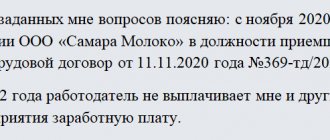New edition of Art. 19.1 Code of Administrative Offenses of the Russian Federation
Arbitrariness, that is, unauthorized, contrary to the procedure established by a federal law or other regulatory legal act, the exercise of one's actual or alleged right, which has not caused significant harm to citizens or legal entities, except for the cases provided for in Article 14.9.1 of this Code -
entails a warning or the imposition of an administrative fine on citizens in the amount of one hundred to three hundred rubles; for officials - from three hundred to five hundred rubles.
Commentary on Article 19.1 of the Code of Administrative Offenses of the Russian Federation
1. The object of the offense is social relations that develop in the process of citizens or legal entities exercising their actual or perceived rights. The legal basis for these social relations is the procedure for the exercise by individuals or legal entities of their rights enshrined in federal laws or other regulatory legal acts.
2. From the objective side, this offense is an act in the form of an action. These are actions aimed at exercising a real or perceived right that do not correspond to the established procedure for the exercise of these rights. This composition, as consequences, involves causing minor harm to citizens or legal entities. The recognition of a particular harm caused as significant is decided when considering the case in each specific case, taking into account the significance of the harm caused for the victims.
The Criminal Code of the Russian Federation provides for arbitrariness as a crime. But there are a number of differences. For arbitrariness to be recognized as a crime, the harm caused must be significant. If an administrative offense contradicts the procedure for exercising one’s actual or presumed right, then the crime contradicts the procedure for committing any actions, that is, the scope of the encroachment of an administrative offense is narrower than the scope of the encroachment of a crime. In addition, an important condition for recognizing arbitrariness as a crime is the challenge by a citizen or organization of the legality of the actions taken. The criminal law provides for such qualifying criteria for arbitrariness as the use of violence or the threat of its use.
3. From the subjective side, this offense is intentional.
4. The subjects of the offense are individual subjects of law.
5. Cases of arbitrariness are considered either by magistrates or judges of garrison military courts, if arbitrariness was committed by military personnel or citizens called up for military training.
Code of Administrative Offenses and Significant Harm
In the Code of Administrative Offenses, arbitrariness is characterized by Article 19 (1) as the unauthorized exercise of someone’s rights without significant harm to the victims.
There is also Article 330 of the Criminal Code, in which such actions, on the contrary, are associated with significant harm to the injured party and are no longer classified as an administrative offense, but as a criminal act.
Consequently, when determining guilt by a court of any instance, the main question is the concept of the significance of the harm.
When considering cases of unauthorized exercise of rights that violate the rights of citizens and legal entities, the judge takes into account all the circumstances of the case and clarifies the details. They play a decisive role in determining the degree of guilt and punishment under the article “Arbitrariness”.
Conflicts caused by arbitrariness are more common in everyday life, falling under the concept of an administrative offense, rather than being of a criminal nature. The lion's share of cases of arbitrariness fall under Article 19.1 of the Code of Administrative Offences, and are considered by magistrates.
Another comment on Art. 19.1 of the Code of the Russian Federation on Administrative Offenses
1. The current legislation of the Russian Federation establishes a certain procedure for subjects to exercise their rights and freedoms. It is the order established by laws and other normative legal acts that is encroached upon by persons committing the offense provided for in the commented article. At the same time, the article itself provides a legislative definition of actions called arbitrariness, according to which such is recognized as unauthorized, contrary to the procedure established by federal law or other regulatory legal act for the exercise of one’s actual or alleged right.
2. The objective side of the commented offense is the implementation of actions of an unauthorized nature, i.e. contrary to the exercise of one’s actual or perceived right established by federal legislation.
3. The subjective side of the administrative offense provided for in the article in question can be expressed both in the form of intent and in the form of negligence. At the same time, arbitrariness does not cause significant harm to individuals or legal entities.
4. The subjects of this offense are citizens and officials. The subjects cannot be legal entities, since arbitrariness must be expressed in a person’s psychological awareness of his actual or perceived rights.
Legislation and responsibility
Responsibility begins at age 16. The maximum statute of limitations for administrative cases of an offense is 3 months.
In case of arbitrariness, you should contact the police. This is stated in Art. 28.3 Code of Administrative Offences. The employee draws up a protocol in which the administrative offense is recorded. It is accompanied by written explanations from both sides of the conflict.
Documents proving the rights of victims as a result of unauthorized actions or recording the fact of a violation are also attached to the protocol.
Art. 19 of the Code provides for the following amounts of penalties for arbitrariness:
- for citizens – from 100 to 300 rubles,
- for violators holding a position in the organization - from 300 to 500 rubles.
The court may also limit itself to a warning to a citizen who has violated the norms of the Code of Administrative Offences.
At the same time, criminal liability for arbitrariness that entails significant harm to the victim is much more serious. Fines under Art. 330 Criminal Code are assigned from 80 thousand rubles and above. In addition, punishment in the form of correctional labor or arrest for up to six months may be applied. If violent actions have taken place, then imprisonment may occur, the maximum term of which is 5 years.
Vegetable garden in the local area (Resolution of the Kaliningrad Regional Court No. 4A-406/2017)
In the city of Krasnoznamensk, Kaliningrad region, they tried to bring a woman to justice under Art. 19.1 of the Code of Administrative Offenses of the Russian Federation for the fact that she unauthorizedly dug up and sowed a section of the local area. The magistrate sentenced the woman to a fine of 200 rubles.
The woman did not agree with the conclusions of the magistrate and filed a complaint, but the appeal court upheld the earlier decision without changes.
In this case, the courts proceeded from the provisions of Art. 247 of the Civil Code of the Russian Federation, according to which “possession and use of property in shared ownership is carried out by agreement of all its participants, and if agreement is not reached, in the manner established by the court.” According to the case materials, the resident did not obtain the consent of all owners to use the disputed land plot; a meeting of owners was not convened on this issue.
The Court of Cassation examined the case materials and found:
- In fact, the established procedure for using the local area between the residents of the apartment building was not legally established. There is no corresponding judicial act. The victim does not have a legally enforceable right to use his share of the adjacent land plot.
- In the situation under consideration, there is no such element of an administrative offense as a violation of the procedure for exercising an actual or alleged right established by a federal law or other regulatory legal act.
- The mere existence of an established procedure for the use of a land plot does not indicate the presence of such an element, since the law does not establish any special procedure for changing the established procedure for use.
- A mandatory general meeting of owners is not required to obtain consent to cultivate any part of the adjacent land plot, the procedure for use of which is not legally fixed.
Thus, actions to process the disputed land plot do not constitute an administrative offense in accordance with Art. 19.1 Code of Administrative Offenses of the Russian Federation.
The Court of Cassation upheld the resident's complaint, overturned the previous decisions and terminated the administrative proceedings.
What is arbitrariness under Article 19.1 of the Administrative Code?
Administrative arbitrariness under Article 19.1 recognizes unauthorized actions of a person that violate the procedure for protecting or exercising one’s own rights. Only an individual can act as a violator. Moreover, the nature of these rights can be both real (when the rights actually belong to the violator) and imaginary (when the rights belong to the victim or are disputed by him). The subject of the offense is a private person who is fully aware of the danger of his actions.
To be brought under administrative article 19.1, two mandatory conditions must be met:
- The offender carries out illegal actions without permission. If a person believes that his rights are being violated, he must make demands against the alleged violator or immediately go to court. If a person takes actions aimed at restoring his rights, without an agreement with a possible violator or without a court decision, then such actions will be considered as arbitrariness.
- As a result of arbitrariness, damage was caused, but its amount was insignificant. At the same time, the nature of the damage can be different - it can be financial losses, indirect economic damage, moral suffering, inability to dispose of one’s property, and so on. To assess the damage, a special examination may be carried out (although in practice this rarely happens). If a person has suffered significant damage, then arbitrariness is automatically reclassified under criminal article 330 of the Criminal Code of the Russian Federation.
Punishment for arbitrariness
For administrative arbitrariness, according to the Code of Administrative Offences, a fairly lenient punishment is imposed depending on the legal status of the violator:
- For citizen violators - from 100 to 300 rubles.
- For violators who are officials - from 300 to 500 rubles.
Can a person be prosecuted for arbitrariness under a criminal article?
Yes, a violator can be prosecuted for arbitrariness not under administrative article 19.1, but also under the more severe criminal article 330 of the Criminal Code of the Russian Federation. Main cases:
- The offender is a legal entity (SNT, garage cooperative, LLC, CJSC, etc.).
- As a result of the offense, significant damage was caused (monetary, property, moral, and so on).
- The offense was committed with the use of violence and/or threats.
AZ-libr.ru
Article 19.1. ArbitrarinessArbitrariness, that is, the unauthorized exercise of one’s actual or perceived right, contrary to the procedure established by federal law or other regulatory legal act, without causing significant harm to citizens or legal entities,
- entails a warning or the imposition of an administrative fine on citizens in the amount of one to three times the minimum wage; for officials - from three to five times the minimum wage.
Comm. Kositsin I.A.
Russian legislation determines the procedure for citizens to exercise their rights. The exercise of these rights in any other manner is unacceptable, which entails liability in accordance with the commented article. Arbitrariness encroaches on the established order of government in the state, as well as the procedure for citizens to exercise their rights.
The commented article contains two offenses. Firstly, the unauthorized exercise of one’s actual right, i.e. contrary to the order established by regulatory legal acts, secondly, the unauthorized exercise of one’s alleged right in the above order. A valid right is a right that belongs to a citizen or official on the basis of a law or by-law. A presumptive right is a right that does not belong to a citizen or official, but, due to an honest mistake, is exercised by them as valid.
The objective side of this offense
characterized by the active actions of a citizen or official to exercise his actual or perceived rights and the absence in these actions of significant harm caused to individuals or legal entities.
It is necessary to distinguish arbitrariness as an administrative offense from arbitrariness as a crime. The objective side of criminal arbitrariness is expressed in the presence of significant harm caused to individuals and legal entities, the state, or in the use of violence or the threat of its use (Article 330 of the Criminal Code of the Russian Federation).
Significant harm can be material or moral; its existence at the time of the commission of the unlawful act is determined by the court. Moreover, the significance of the harm is not necessarily determined by amounts equivalent to the amount of material damage. In some cases, harm can be assessed based on the particular value of the violated good for the victim, for example, the right to use living space.
Arbitrariness can be committed with both direct and indirect intent.
Subject of the offense
Only an individual - a citizen or an official, including a person carrying out entrepreneurial activities without forming a legal entity - can appear.
Cases of administrative offenses
considered by magistrates.
Officials of internal affairs bodies (police) are authorized to draw up protocols on administrative offenses.



